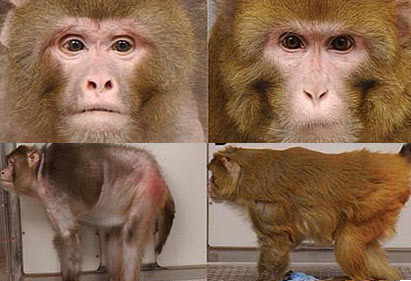Eat a lot of old age, die early
For more than 20 years, monkeys that eat comfortably have a three times higher risk of death than those with restricted diets, a long-term study has just published.
The benefit of long-term calorie restriction has been noted in animals, but now, this result has been demonstrated in a species with close relatives to humans, for long periods of time.
Sterling Johnson, a neuroscientist at Madison Medical School, University of Wisconsin, tested 76 brown monkeys. The trial began in 1989, expanded in 1994 and continues to date. Half of them have to go on a strict diet (30% reduction in calories, but still have enough nutrition), the rest are comfortable to eat.
The research team found that in the diet group monkey, the rate of cancer and cardiovascular disease was less than half that of the free-group.
In addition, if diabetes and glucose metabolism problems are common in monkeys who like to eat, then there are no cases in the controlled diet group.
The dieting monkey group seems to maintain brain size in at least a few areas, compared to the shrinking brain of most children in the other group. In particular, brain regions associated with movement and memory seem to be best preserved.

At the age of 27, both monkeys are old, but the one on the left belongs to the group eating comfortably during his life, and looks worse.(Photo: BBC)
Writing in Science magazine, the team evaluated the study to show " a strong influence " of the diet.
Earlier this year, German researchers also announced discoveries in elderly people, indicating that reducing calories seems to improve memory, only after a period of 3 months. Many other works have also shown that the positive effect of calorie restriction on life expectancy (from yeast species to dogs) has been published in the last 70 years.
However, it is unclear whether the same effect occurs in humans, although oral evidence has shown that people with long-term diets have a better cardiovascular system.
Experts note that monkeys are just close relatives of people, and there are significant differences. That means that what is seen in monkeys does not necessarily appear in humans. In addition, abstinence will significantly affect the development of the body, especially in people under 30.
- Should children go to kindergarten early?
- Want to come up with an idea, think at 22:04
- Mistakes make it hard for you to become an early riser
- Get up early to be happy
- Work related reasons make you die early
- 8 tips to help you wake up easier in the winter
- Use nano sensors to diagnose cancer early
- How to sleep earlier? The solution is here!
- Sleep habits and early risers can be caused by genetic changes
- Scientific explanation for the myths
- New breakthroughs help early menopausal women have children
- Find out how to detect cancer early
 Green tea cleans teeth better than mouthwash?
Green tea cleans teeth better than mouthwash? Death kiss: This is why you should not let anyone kiss your baby's lips
Death kiss: This is why you should not let anyone kiss your baby's lips What is salmonellosis?
What is salmonellosis? Caution should be exercised when using aloe vera through eating and drinking
Caution should be exercised when using aloe vera through eating and drinking